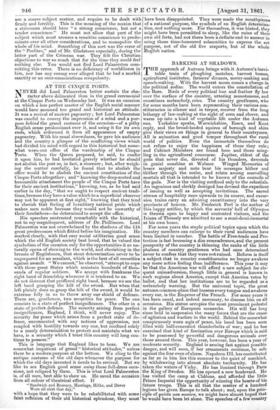AT THE CINQUE PORTS. N EVER did Lord Palmerston better sustain
the cha- racter above delineated than in the grand ceremonial at the Cinque Ports on Wednesday last. It was an occasion on which a less perfect master of the English social manner would have assumed too grand and historical an attitude. It was a revival of ancient pageantry ; but Lord Palmerston was careful to convey the impression of a mind and pur- pose behind the grand costume of the occasionâof a pithy English sense predominant over it, and using it for its own ends, which redeemed it from all appearance of empty pageantry. With his usual shrewdness, he gave his audience and the country a glimpse of the conflicting views which had divided his mind with regard to this historical but some- yhat worn-out office of the wardenship of the Cinque Torts. When the Queen proposed, he said, to confer it upon him, he had hesitated gravely whether he should not abolish the post as, in fact, a sinecure ; but, after weigh- ing the matter carefully, he found that to abolish the office would be to abolish the ancient constitution of the Cinque Ports altogether ; and" knowing the deep-rooted and honourable attachment the people of the Cinque Ports have for their ancient institutions," knowing, too, as he had said earlier in the day, "that we ought to respect ancient tradi- tions,because they have a value which to a superficial observer may not be apparent at first sight," knowing that they tend to cherish that feeling of hereditary national pride which makes men noble because they would not be unworthy of their forefathersâhe determined to accept the office. His speeches contrasted remarkably with the historical, not to say magniloquent, address of Dr. Phillimore. Lord Palmerston was not overwhelmed by the shadows of the 118 great predecessors which flitted before his imagination. He marked clearly, with that easy social utilitarian good sense nhich the old English society best loved, that he valued the symbolism of the occasion only for the opportunities it so na- turally opens of showing to the world, and cherishing in the breasts of Englishmen, that stout determination never to be unprepared for an assailant, which is the best of all securities against assault. "We cannot," he observed, "attempt to cope with those great States which maintain hundreds of thou- sands of regular soldiers. We accept with frankness the right hand of friendship wherever it is tendered to us. We do not distrust that proffered right hand, because we see the left hand grasping the hilt of the sword. But when that left plainly dues so grasp the hilt of the sword, it would be extreme folly in us to throw away our shield of defence. There are, gentlemen, two securities for peace. The one consists in a state of perfect insignificance. The other in a state of perfect defence. The security arising from perfect insignificance, England, I think, will never enjoy. The security for peace which arises from a perfect state of de- fence, unconnected with any notions of aggression, not coupled with hostility towards any one, but confined solely to a manly determination to protect and maintain what we have, is a security which I trust this country will long con- tinue to possess." This is language that England likes to hear. We are somewhat impatient of grand "historical attitudes," unless there be a modern purpose at the bottom. We cling to the antique costume of the old days whenever the purpose for which the old days invented it needs to be revived. But we like to see English good sense using these full-dress occa- sions, not eclipsed by them. This is what Lord Palmerston is, of all men, best able to show us. He saved the occasion from all colour of theatrical effect. If "Sandwich and Romney, Hastings, lithe, and Dover Were all alert that day," with a hope that they were to be rehabilitated with some faint reflexion of their old historical splendour, they must have been disappointed. They were made the mouthpieces of a national purpose, the symbols of an English determina- tion, and nothing more. For themselves, it was hinted, they might have been permitted to sleep, like the ruins of their own old forts, had not there been a definite end to answer in using those time-honoured solemnities to express the set purpose, not of the old five seaports, but of the whole English nation.






























 Previous page
Previous page